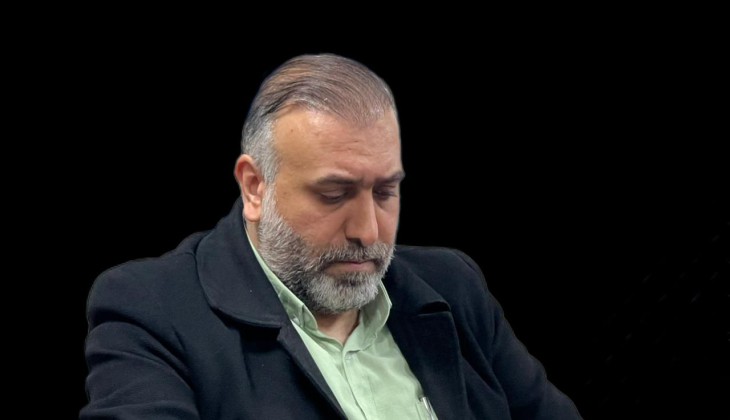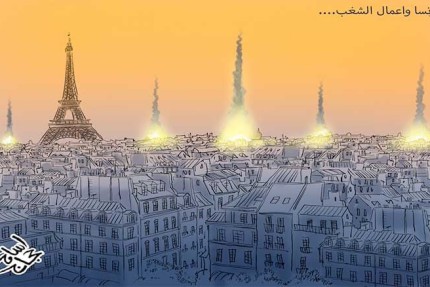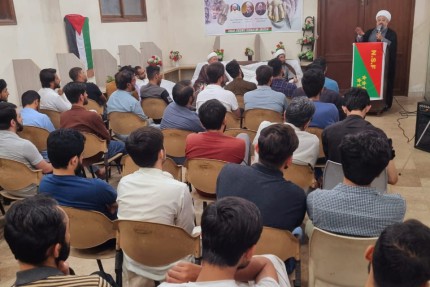Dr. Mohammad Ali Senobari
Honest Promise: A New Dawn for Iranian Military Prowess

The night of April 14 was not just any ordinary night, but a historical one that will rewrite the future of the Middle East and the world. It was the night when the Iranian Air Force, directly from Iranian soil, launched 300 missiles and drones targeting specific military installations in Israel.
Iran successfully destroyed these targets, with one of the most significant being the military base that had launched Israel’s cowardly attack on the Iranian consulate in Damascus. The streets in Iran were not the only ones alive with celebrations of this great victory over the occupying regime; most of the Arab and Islamic cities stayed awake, their inhabitants shouting the takbirs in support of Iran’s triumph.
After enduring over six months of continuous warfare by Israel against Gaza, the people of Gaza had a night of quiet, feeling confident and empowered by the attack of the Islamic Republic of Iran, which laid bare the vulnerability and fragility of the occupying regime. Iran’s operation, named ‘Operation Honest Promise,’ revitalized the spirit of resistance in the oppressed people across Arab and Islamic lands, bringing closer a significant victory over Israel. Operation Honest Promise stands out as it is the first extensive military operation since the October War in 1973. During this operation, Iran sought to punish and discipline both Israel and the United States by bridging a distance of more than 1,500 kilometers between Iran and the occupied territories.
Iran’s attack made settlers, soldiers, and officials in Israel experience a fraction of what the defenseless people of Gaza have endured for more than six months—constant killing and destruction. Thus, this attack was exceptional and took on a sophisticated nature. From a military and offensive perspective, Tehran strategically used drones initially to engage the air defense systems of Israel and the United States, which were then followed by suicide drones and a mix of Iranian ballistic and cruise missiles. These drones and missiles managed to evade the air defenses and warplanes from a multitude of countries including Britain, Jordan, America, and Israel, and accurately struck their targets in the occupied territories.
Notably, all this was accomplished without Iran needing to resort to its hypersonic missiles, which could reach the occupied territories in mere minutes.
These hypersonic missiles, along with a slew of other advanced weaponry Tehran has yet to unveil, are kept in reserve for any future escalations.
Simultaneous with the military onslaught, Iranian forces and their allies in the axis of resistance executed a massive cyberattack that incapacitated several Israeli offices and institutions. Israeli media reported that these cyberattacks directly disabled some air defense systems and also led to power and internet blackouts over large areas of Israel. Meanwhile, in a coordinated geographic assault, Iran’s allies launched extensive attacks from southern Syria, southern Lebanon, Iraq, and Yemen, simulating the ultimate battle with Israel, where the strategy of ‘unity of arenas’ was implemented.
Iran’s historic attack on April 14 compelled a reconsideration of Iran’s regional and international deterrence equation. This attack not only showcased Iran’s military capabilities but also demonstrated Iran’s readiness to respond militarily in the face of threats to its interests and dignity. As proof of Iran’s deterrence capability, it is important to highlight the repeated statements by the United States, by President Biden, his Defense Minister Lloyd Austin, and the Pentagon, emphasizing their reluctance for military conflict with Iran and non-intervention in any potential Israeli retaliatory strikes.
Over the years, there has been discourse about the emergence of a multipolar world, transitioning from the American unipolar model established following the Soviet Union’s collapse in the 1990s. Although these analyses were grounded in reality, they often lacked concrete empirical evidence. However, post-April 14, clear indications of shifting global decision-making centers and a redistribution of power centers emerged. Iran executed its threats against Israel, disregarding warnings from England and America about potential military intervention.
After Iran’s significant attack, Biden and his advisors hid in the basement, deciding that America’s response to Iran would be diplomatic, in coordination with the leaders of the Group of Seven.
Since its establishment, the Islamic Republic of Iran has remained a formidable international actor, imposing its equations and perspectives on regional and international powers, and championing the oppressed. The Islamic Revolution itself posed a challenge to America’s dominance over the region, and with every foreign policy maneuver and regional alliance, it prioritized the Palestinian issue as a fundamental and principled driver.
The huge and dreadful response from the Islamic Republic implies that all strategic routes in West Asia lead to Tehran.
The new equation of Iran’s deterrence underscores a new future for the Middle East that cannot be envisioned without considering the interests of Iran, the axis of resistance, and the Palestinian nation. Concerning the level of collective security in West Asia, the attack named ‘Operation Honest Promise’ demonstrated that neighboring countries are more likely to rely on their alliance with the Islamic Republic of Iran rather than depending on American and Israeli forces. This attack showed the extent of America’s inability to offer any substantial assistance to Israel and illustrated that an alliance with America is akin to building a house of sand near the sea. With the publication of images showing Netanyahu and Israeli leaders in underground meetings amid panic and fear, it became clear to people and leaders around the world that the end of the usurping Zionist regime is inevitably near.
In conclusion, one cannot overlook a very clear fact: in Iran, there is an immense degree of cohesion and mutual trust between the leaders and the people. As soon as the punishment of Israel was announced, large crowds took to the streets to celebrate Iran’s victory and rejoice in Iran’s support for the Palestinian people in Gaza.
These ancient Islamic people never miss an opportunity to demonstrate their full loyalty to this just and humanitarian cause of Palestine. This mutual trust empowered the supreme leader of the revolution, Ayatollah Khamenei, and the leaders of the army and the Revolutionary Guards to plan and order this massive and unprecedented attack. This cohesive relationship ensured that the people of Iran went about their daily tasks without feeling the slightest danger or threat; they did not raid stores to hoard food, they did not retreat to basements, and they did not succumb to panic.
They are fully confident that the largest army and the most formidable military arsenal in the region will secure their territory and deter Israel and the United States from any future recklessness.
Director and editor-in-chief of the New Vision Center for Strategic Studies
Comment
- Behind the Scene of the Attack in Oman, Operating Schemes that Intend to Destabilize the Country
- Trump’s Assassination Was a Ridiculous and Pre-organized Drama
- The Syrian senior analyst Views Towards the Letter of Iran’s President -Elect to the Secretary General of Hezbollah of Lebanon
- The hard way to political agreement in France/ Will Macron remain in power?
- Navigating the Caspian: Energy, Trade, and Geopolitical Harmony
- Behind the Scene of the Attack in Oman, Operating Schemes that Intend to Destabilize the Country
- Trump’s Assassination Was a Ridiculous and Pre-organized Drama
- The Syrian senior analyst Views Towards the Letter of Iran’s President -Elect to the Secretary General of Hezbollah of Lebanon
- The hard way to political agreement in France/ Will Macron remain in power?
- Navigating the Caspian: Energy, Trade, and Geopolitical Harmony
- Holding Public Court in Damascus to Put the Zionist Regime on Trial
- Boycotting Israeli Athletes for the Olympics in France Is Indispensable
- Iraqi Media Activists Arrested in Saudi Arabia/ Using the Hajj pilgrimage for settlement with the opponents
- Syrian Journalist and Author Tabib Ahmad Al-Darzi’s Analysis on Ali Bagheri’s Trip to Syria
- What Does it Mean on the Verge of Collapse and Has Israel Reached This Stage
- We Stand in an Era of Fundamental Changes/the World’s Political Literature is Changing
- The Art of Soft Power: How Khomeini and Khamenei Used Words to Transform the World
- Mey Sobhi Khansa’s views towards the Hague court verdict and the martyrdom of I R Iran president
- Behind the Scene of the Attack in Oman, Operating Schemes that Intend to Destabilize the Country
- Trump’s Assassination Was a Ridiculous and Pre-organized Drama
- The Syrian senior analyst Views Towards the Letter of Iran’s President -Elect to the Secretary General of Hezbollah of Lebanon
- The hard way to political agreement in France/ Will Macron remain in power?
- Navigating the Caspian: Energy, Trade, and Geopolitical Harmony
- Holding Public Court in Damascus to Put the Zionist Regime on Trial
- Boycotting Israeli Athletes for the Olympics in France Is Indispensable
- Iraqi Media Activists Arrested in Saudi Arabia/ Using the Hajj pilgrimage for settlement with the opponents
- Syrian Journalist and Author Tabib Ahmad Al-Darzi’s Analysis on Ali Bagheri’s Trip to Syria
- What Does it Mean on the Verge of Collapse and Has Israel Reached This Stage




